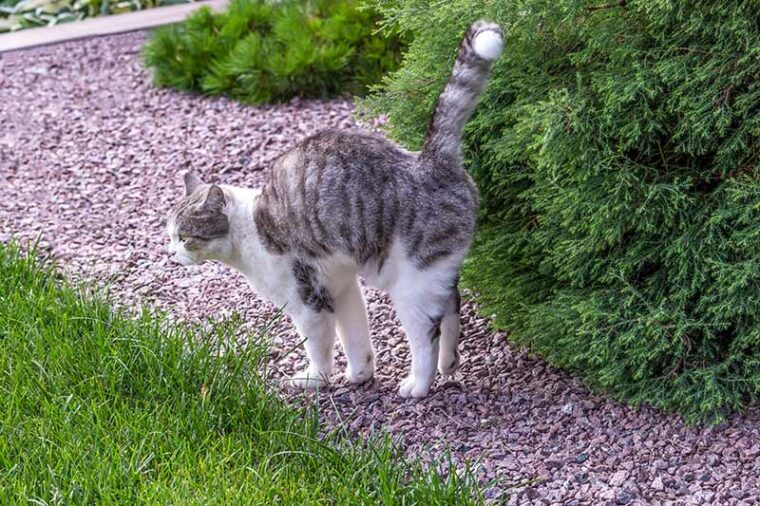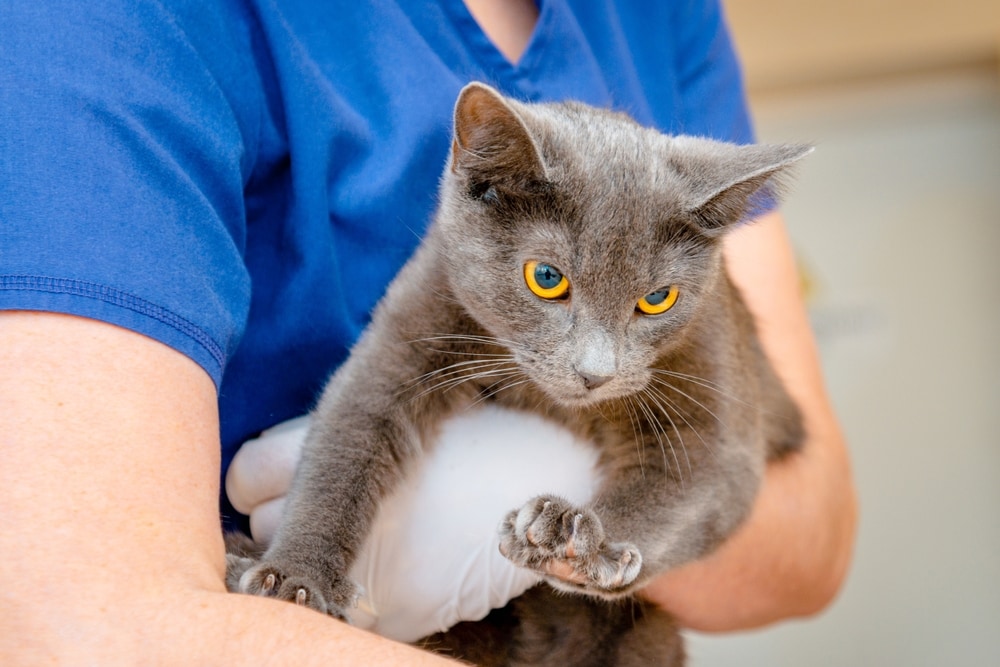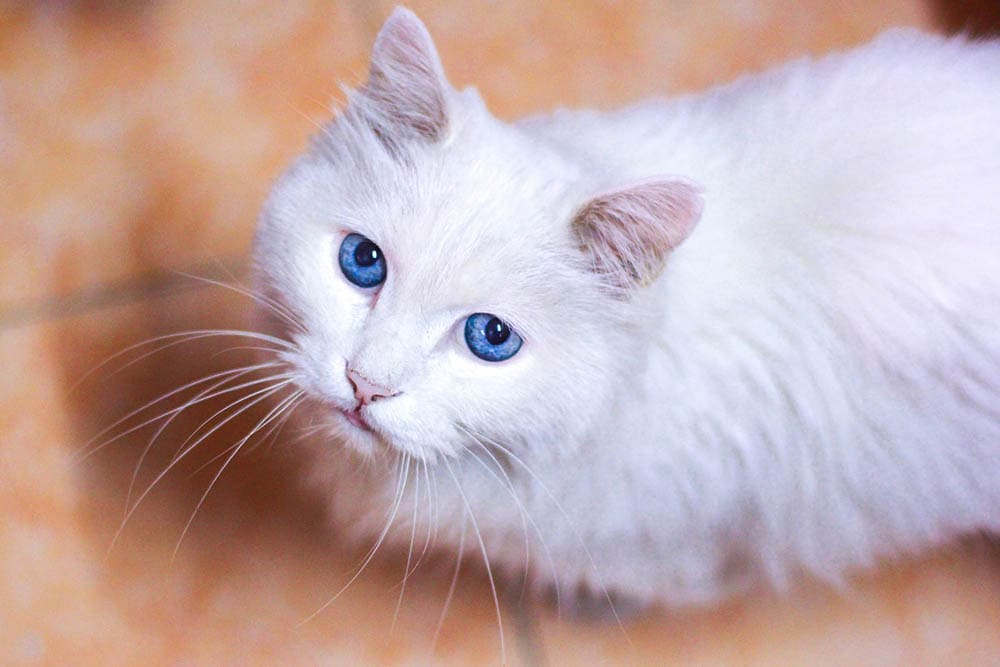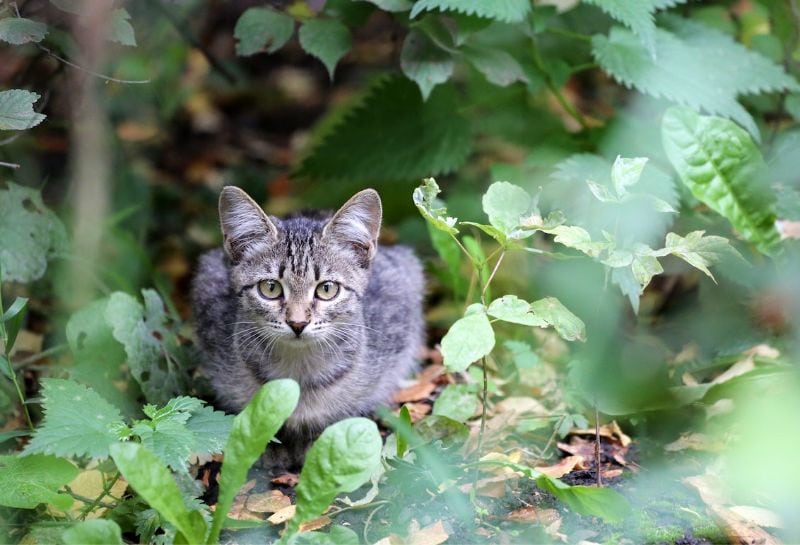
As cat parents, cat spraying is an unfortunate situation you’ll likely deal with at some point. This frustrating act can leave you scratching your head, wondering how to stop it from happening. Inappropriate urine elimination can be complex, and there’s a difference between that and spraying, but how do you differentiate the two?
Inappropriate urine elimination involves your cat urinating outside the litter box—this is different from spraying due to the causes, smell, and even in the way it’s done. Spraying typically involves the cat backing up against an object, raising the tail, and letting the urine spray out onto a vertical surface rather than crouching and leaving a puddle on the floor.
Why Do Cats Spray?
Several reasons are to blame for cat spraying, such as attracting a mate, marking territory, communicating with other cats in the home, strays roaming in the yard, and stress. In this post, we’ll list five expert tips on how to stop your cat from spraying so that you can eliminate this stinky and frustrating problem.
The 5 Tips on How to Stop Your Cat From Spraying
1. Spay or Neuter Your Cat

Both males and females spray, but it’s more common in male cats. Cats are naturally territorial and spraying leaves important cues for other cats in the area. Nonetheless, a female in heat can definitely spray in an attempt to lure over a potential mate. The urine will have a pungent and strong odor, much like a tomcat’s. Upon castration, the urine odor will change and the procedure will likely discourage your cat from spraying; however, it may still continue to occur in some instances. Spraying is more likely to occur in a home with multiple cats, but it can still occur in a single-cat home.
2. Rule Out Medical Issues
An underlying medical issue could be the cause of spraying, such as kidney problems, bladder stones, or feline lower urinary tract disease (FLUTD). Roughly 30% of cat spraying issues are due to an underlying health issue, and taking your cat in for an examination is imperative to rule it out. Your vet will conduct a urine analysis to determine if that is indeed the issue so that it can be addressed. Your vet can also determine if the problem is behavior-related and refer you to a behavioral specialist if need be.
3. Reduce Your Cat’s Stress

Changes in a cat’s environment or living conditions can cause stress, and therefore, can lead to cat spraying. Some cats may urinate outside the litter box when stressed, but some may spray vertically on a flat object such as a wall.
Adding a new family member or new pet to the home can cause stress for your cat, as well as any remodeling or construction going on in the home. A move to a new home can also be the culprit for causing stress to your cat, along with moving the litter box or changing feeding schedules.
Keep your cat on a regular schedule with things you can control, such as the placement of litter boxes and feeding schedules. If the problem is out of your control, such as remodeling or a move to a new home, you can try vet-approved anxiety-reducing supplements to help ease your cat’s stress.
4. Address Animosity Issues
Having multiple cats in the home can create jealousy and encourage territory marking. One issue that can cause conflict is the number of litter boxes in the home. A rule of thumb is to have one litter box per cat and an extra; for example, if you have two cats, you’ll need three litter boxes spread throughout the home to prevent one cat from guarding all the boxes. Also, each cat should have its own litter box and food and water bowls.
If you’re adding a new cat into the home, gradually introduce the pair and start slowly to allow the resident cat to adjust and acclimate to a new cat being in the home.
5. Keep Strays Away From Your Yard

Stray cats can wander into your yard and into your cat’s vision (or in other instances, your cat might know of their presence via their scent), which can cause your cat the need to mark their territory. In that case, you may need to cover any windows to keep your cat from seeing the stray, but this isn’t ideal if your indoor cat loves to look out the window, as most indoor cats do.
You can install motion-detection sprinklers to activate when a stray enters your yard, which will make it dart off quickly (most cats hate being wet). Sprinklers will scare the stray cat without harming it.
What to Do When Your Cat Sprays
When your cat sprays inside the home, it leaves a pungent, foul odor that is certainly not pleasant—having cat urine wafting throughout your house is something no one wants, and when it happens, you’ll need to address the issue—this will also discourage the cat from spraying in the same spot repeatedly.
Clean the soiled spots with a mild detergent and spray them clean afterward with a cat-safe detergent for a final wipe. Avoid strong-smelling cleaners, as these may provoke more spraying on the spot. You can also make soiled areas inaccessible to your cat to prevent spraying or marking in the same area. Lastly, keep unfamiliar objects out of your cat’s presence to discourage spraying.
If you're trying to find an enzyme cleaner that does it all, we highly recommend our favorite cleaner, the Hepper Advanced Bio-Enzyme Pet Stain & Odor Eliminator Spray.
- ADVANCED ENZYMATIC CLEANER - Penetrates the most stubborn smells and stains at the deepest molecular...
- FOR ANY MESS, ON ANY SURFACE - This pet odor eliminator cleans your carpets, floors, furniture,...
- FRESH, NATURAL ODOR - Our unique formulation doesn't rely on dangerous or unpleasant chemical...
It permanently removes the very worst stains and smells you can imagine and makes clean up a breeze. There's even a 100% satisfaction guarantee! Click here to order a bottle today.
At Pet Keen, we’ve admired Hepper for many years, and decided to take a controlling ownership interest so that we could benefit from the outstanding products of this cool cat company!
Conclusion
Cat spraying is a frustrating issue that most cat owners will encounter at some point. When it happens, it is vital to determine the cause so the issue can be addressed. It is also important to determine if your cat has an underlying medical problem that’s causing the issue, as medication may be needed to remedy the issue.
When all else fails, seek the help of your veterinarian for suggestions or to determine if a behavioral specialist is needed.
Featured Image Credit: Helen Liam, Shutterstock







